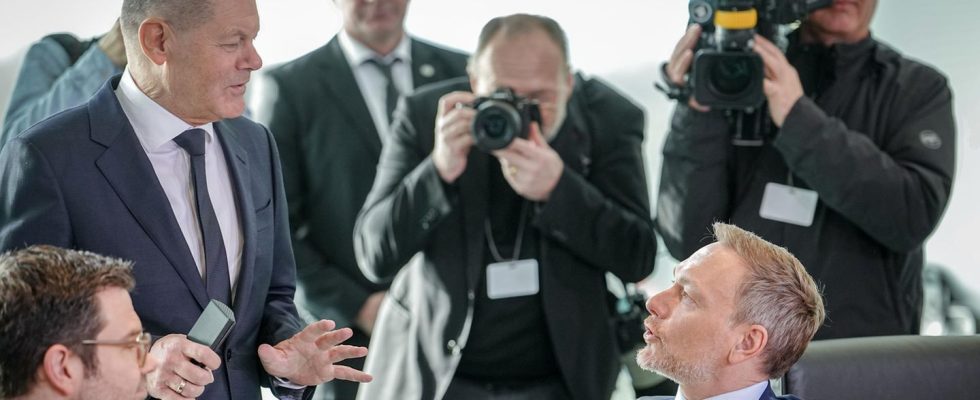Trump threatens NATO
Deterrence: Finance Minister Lindner can imagine a European nuclear protective shield
Chancellor Olaf Scholz and Finance Minister Christian Lindner (r.) are deep in a discussion
© Kay Nietfeld / DPA
Can Germany defend itself in an emergency? And is there a need for a nuclear deterrent with the EU partners? Opinions on this differ in the traffic light coalition.
The doubts about US military support after Donald Trump’s election victory are fueling the debate about Germany’s defense capability – right up to the option of a shared nuclear one Deterrence in Europe. The SPD’s top candidate for the European elections, Katarina Barley, questioned the reliability of the US nuclear weapons shield. On the question of whether the EU needs its own nuclear bombs, she told the “Tagesspiegel”: “On the way to a European army, that can also become an issue.”
Federal Finance Minister Christian Lindner spoke out in favor of more cooperation with France and Great Britain on nuclear deterrence. “French President Emmanuel Macron has presented various offers of cooperation,” wrote the FDP chairman in a guest article for the “Frankfurter Allgemeine Zeitung”. “We should see Donald Trump’s recent statements as a call to further rethink this element of European security under the NATO umbrella.”
Lindner deviates from Scholz’s line on nuclear deterrence
In doing so, Lindner deviates from the previous line of Chancellor Olaf Scholz, who has so far rejected a debate about a change of course in NATO’s nuclear deterrent. This is currently based almost exclusively on US nuclear weapons. Great Britain and France are the only two other NATO states that have such weapons systems. Macron had already offered Germany and other EU partners talks about European cooperation on nuclear deterrence in 2020 – so far without much response.
Former US President Trump said during a campaign appearance that he would not protect NATO partners who did not invest enough in defense from Russia in an emergency. He would “even encourage Russia to do whatever the hell they want.” This questioning of NATO’s duty to provide assistance triggered a wave of indignation. Trump wants to run for president again in November.
Scholz (SPD) made it clear again on Monday evening – after Trump’s threats – that he was relying on the current NATO deterrent system. “We have a functioning NATO, a very good transatlantic partnership. This also includes what we have developed in terms of nuclear cooperation,” he said at a press conference with Polish Prime Minister Donald Tusk in Berlin. Germany is involved in so-called nuclear sharing by maintaining combat aircraft that would be able to hold nuclear weapons stationed in Germany in the event of an emergency.
The Union faction calls on Scholz to position himself
The Union faction called on Scholz (SPD) to take a position on Barley’s statements about possible EU nuclear weapons. The Chancellor must ensure clarity, said parliamentary group vice-president Johann Wadephul to the “Tagesspiegel”.
The CDU defense politician Roderich Kiesewetter was meanwhile open to a significant increase in the special pot for the Bundeswehr. “It’s completely clear that we need 300 billion instead of 100 billion so that the Bundeswehr can become combat-ready,” he told the “Süddeutsche Zeitung.” At the same time, a permanent defense budget of at least two percent of economic power must be achieved. However, a spokesman for the Union faction told the German Press Agency: “Mr. Kiesewetter’s proposal is not the opinion of the CDU/CSU parliamentary group.”
The Federal Minister of Finance expressed skepticism about calls to significantly increase the special funds for the Bundeswehr. “By strengthening our economic dynamism, we will have to make it easier for us to mobilize more money for defense spending in the next few years,” said Lindner during a visit to Dublin.
Study: Germans want more defense
The traffic light coalition can rely on a solid majority of the population when making decisions to expand defense capabilities. According to a study by the management consultancy PwC, 68 percent of Germans support this project, but 63 percent also think that the “turning point” announced by Chancellor Olaf Scholz (SPD) in March 2022 has not yet reached the Bundeswehr. The majority consider the necessary investments to be necessary: 57 percent support the intention to invest two percent or more of the gross domestic product in defense; 31 percent see this critically.
“In the summer 2022 survey, we were able to determine how much the population was shocked by the Russian attack on Ukraine and how clearly there was a change of heart on defense issues. The results from 2024 underline that people are still very worried and would like more efforts to strengthen security,” explained Wolfgang Zink from the study’s author team.
58 percent of those surveyed believe that expanding the troop presence on NATO’s eastern flank, especially with the planned German combat brigade in Lithuania, is rather necessary. When asked about their attitude towards the Bundeswehr, only 45.5 percent expressed themselves positively. In 2022, 54 percent still had a positive perception of the Bundeswehr.
When it comes to the question of whether Ukraine will be able to successfully assert itself against Russia with the support of the West, Germans are skeptical: 39 percent see opportunities. 48 percent are rather skeptical about Ukraine’s long-term resilience.
Doubts about the reliability of the US ally
Those surveyed are very skeptical about whether NATO and the West would continue their deterrence policy towards Russia as before if Trump were re-elected as US President. Only 7 percent consider the USA to be reliable in this regard, while 15.4 percent have a fairly high level of trust. A clear majority of 59.1 percent expect that the USA would reduce its commitment to Ukraine under Trump.

